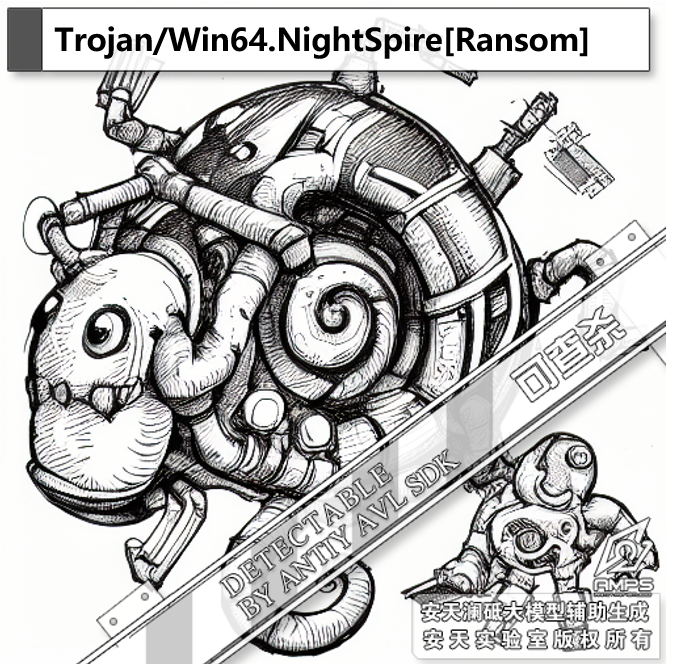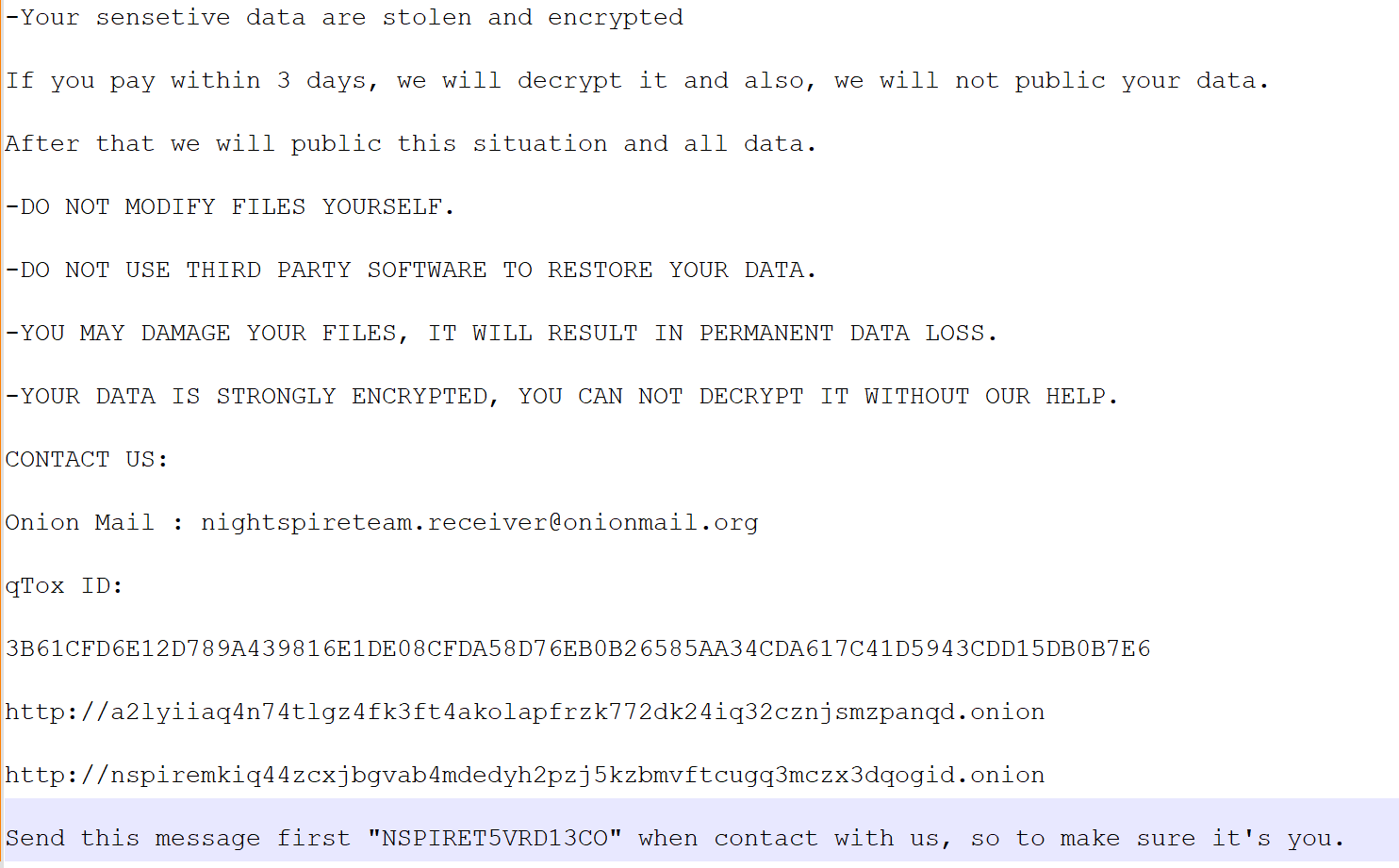Antiy AVL SDK Anti-virus Engine Upgrade Announcement(20250712)
Based on the principles of transparency, accessibility, usability, verifiability and perceptibility of security capabilities, Antiy releases weekly updates of the AVL SDK anti-virus engine and the full set of capabilities to the public every week.
1. Weekly Update
Statistical period: July 05, 2025 ~ July 11, 2025
Antiy AVL SDK anti-virus engine released a total of 84 virus database updates this week, with an average of 12 updates per day, adding 31 new detectable malicious code families, 3,816 new detectable malicious code variants, and 12,403 new detection rules.
The following table shows the TOP5 newly detectable malicious code families:
| Number | Virus Name | Virus Description |
| 1 | Trojan/MSIL.CelestialCStealer | This family is a type of Trojan that enters the victim’s computer system by deceiving users or carrying other malicious software. Once infected, it runs in the background and steals sensitive information in a hidden manner, monitors user activities and sends data to remote servers. |
| 2 | Trojan/JS.PhisClickFix | This family is a type of Trojan that mainly achieves the attack on the target system by downloading and executing malicious scripts. It has strong download and execution capabilities and can bypass the detection mechanism of antivirus software, posing a serious threat to the system. |
| 3 | Trojan/Win64.NightSpire[Ransom] | This family is a type of Trojan that is usually spread through phishing emails, malicious downloads or vulnerability exploitation. Once infected, this malicious software will encrypt the user’s files and demand ransom for the decryption key, posing a serious threat to the computer system. |
| 4 | Trojan/MSIL.KatzStealer | This family is a type of Trojan, typically spread through malicious email attachments, software bundling, or exploiting vulnerabilities. It can steal sensitive information, execute remote commands, and maintain persistent control over the compromised host. |
| 5 | Trojan/Win32.Erbium | This family is a type of Trojan, often disguising itself as normal files or programs to deceive users into installation. Once infected, it conducts various malicious activities, including stealing users’ personal information and monitoring their online activities. |
(According to the HASH number of family samples within the period)
For more related content, please visit www.virusview.net (the Computer Virus Encyclopedia).
2. Full Detection Capabilities
As of 24:00 on July 11, 2025, the AVL SDK anti-virus engine can detect 18,100,676 malicious code variants of 57,336 malicious code families distributed in 8 basic categories, with a total of 40,716,915 detection rules.
The detection capabilities and the number of rules classified by malicious code are as follows:
| Type | Detectable Malicious Code (Types) | Detection rules (Items) |
| Infectious viruses | 58,599 | 6,911,666 |
| Worms | 309,246 | 3,976,770 |
| Trojans | 13,102,540 | 24,436,309 |
| Hacking tools | 446,473 | 343,739 |
| Risk tools | 1,195,635 | 2,142,437 |
| Rogue software | 2,988,155 | 2,904,846 |
| Junk files | 10 | 1,096 |
| Test programs (for self-test) | 18 | 52 |
| Total | 18,100,676 | 40,716,915 |
Preprocessing Capabilities (partial) :
There are 31 types of unpackable executable packers and 132 types of recognizable or extractable packages (including self-extracting archives).
Supporting Knowledge Output Capabilities:
For malicious code payloads, the AVL SDK is used in conjunction with the malicious code knowledge base, which can output 533 types of key behavior mapping tags and 139 types of ATT&CK threat attack framework technical and tactical tags, with a coverage rate of 64.29%, basically covering all the statically detectable tags in the ATT&CK framework.
3. Be on Guard Against These Virus Families This Week
Recently, Antiy Labs has detected an active ransomware sample on the Windows platform, named Trojan/Win64.NightSpire[Ransom]. This ransomware was captured in July 2025. The NightSpire family penetrates victims’ networks through various means such as phishing, exploiting vulnerabilities, and being bundled with other malicious software. The NightSpire ransomware uses the “AES+RSA” algorithm to encrypt files. As of now, no tools have been found that can effectively decrypt the data encrypted by the NightSpire ransomware.

3.1 Overview of the NightSpire Ransomware Family
|
Organization name |
NightSpire |
|
Appearance time |
July 2025 |
|
Intrusion methods |
Phishing |
|
Decryption tool |
No public decryption tools have been found |
|
Encryption system |
Windows |
|
Payment method and amount of ransom |
Contact via mails |
|
Whether double extortion |
Yes |
|
Encrypted file extension |
nspire |
|
Ransom note |
|
3.2 Recommendations for Protection
For this ransomware, Antiy recommends the following protective measures:
(1) Install terminal anti-virus software: It is recommended to use host anti-virus and protection products such as Antiy Intelligent Endpoint Protection System that use the AVL SDK engine. It is recommended that users of Antiy IEP enable the ransomware defense tool module (enabled by default).
(2) Enhance password strength: Avoid using weak passwords. It is recommended to use 16-character or longer passwords, including combinations of uppercase and lowercase letters, numbers, and symbols. At the same time, avoid using the same password on multiple servers.
(3) Regularly change passwords: Change system passwords regularly to avoid password leaks that may lead to system intrusions;
(4) Timely update patches: It is recommended to enable the automatic update function to install system patches. System patches should be updated in a timely manner for vulnerable parts such as servers, databases, and middleware.
(5) Close high-risk ports: Adopt the minimization principle to external services and close unused high-risk ports such as 3389, 445, 139, and 135.
(6) Email security: Handle suspicious emails carefully to avoid downloading unknown attachments or clicking on unfamiliar links.
(7) Disable PowerShell: If you are not using the PowerShell command-line tool, it is recommended to disable it.
(8) Regular data backup: Regularly back up important files, and the backed-up data should be isolated from the host.
Antiy Emergency Response Service
Antiy continuously empowers users to build an effective network attack security protection system and achieve effective security value.
National service hotline: 400-840-9234
Service support email: support@antiy.cn
Be Vigilant Against New Threats, Fortify Data Defenses!
Appendix: Introduction to Antiy AVL SDK Anti-Virus Engine
Antiy AVL SDK anti-virus engine is a threat detection capability middleware developed by Antiy for all architectures and system platforms. By embedding the AVL SDK, Antiy products and ecosystem partners’ products can acquire virus and malicious code detection capabilities, and receive continuous updates through the virus database.
For eight malicious code categories including infectious viruses, worms, Trojans, hacking tools, gray software, risky software, junk files, and test files, it accurately identifies and detects over 50,000 families and 18 million malicious code variants. The detection capability fully covers all known malicious codes and strictly adheres to the CARO convention. The output is structured and named in sections by classification, environment, and family, and based on the behavioral capabilities of malicious samples, it outputs nearly a hundred types of malicious behavior tags for typical malicious behaviors such as encryption ransomware, data theft, remote control, botnet programs, and mining. Antiy Engine can recognize over 300 file formats and conduct in-depth preprocessing on compilable executable formats such as PE and ELF. It also performs recursive unpacking of various packages (including self-extracting archives), and conduct structural analysis of compound documents such as OFFICE and ACAD files that may contain embedded scripts or vulnerability-prone formats. This ensures high robustness against malicious code. Antiy Engine also comes with a trusted file signature library, supporting the product to implement security policies based on blacklist and whitelist controls, significantly enhancing the difficulty for attackers.
Antiy’s detection capabilities can be fully deployed locally. Antiy automatically analyzes and processes over 2 million new file objects on average every day and releases a virus database update every two hours. It also provides support services such as cloud detection, cloud analysis, and computer virus encyclopedia.
Antiy AVL SDK is available in various versions such as traditional PC hosts, smart terminals, network traffic, IT application innovation systems, industrial systems, and unmanned systems. It provides threat detection capabilities for scenarios including host system and workload security, network traffic security, business flow security, email and file service security, etc. It fully supports various architectures such as X86, ARM, MIPS (including Cavium), RISC, and PowerPC, supports a variety of mainstream operating systems including domestic operating systems, Linux, and Windows, as well as real-time industrial operating systems like Vxwork. It also supports high-speed detection in backbone network scenarios.
Antiy AVL SDK empowers over 100 industry partners. In addition to Antiy’s own product deployment, Antiy Engine has cumulatively covered more than 4 billion nodes (including mobile terminals, secure and controllable PC endpoints, cloud-native nodes, network devices, network security devices, etc.), providing inherent security detection capabilities for mobile phones and smart terminals. The main partners using Antiy Engine include mobile phone enterprises such as Huawei, Xiaomi, Honor, VIVO and OPPO, large Internet enterprises such as Ant Financial, and several listed cybersecurity companies. Partner products using Antiy Engine have won internationally renowned evaluation awards such as AV-TEST and NSS Labs. The “L Tomahawk” logo of AVL SDK has become a symbol of reliable anti-virus capabilities.
All of Antiy’s products, including but not limited to IEP security protection system product family, Unified Workload Protect, Persistent Threat Detection System (PTD), Persistent Threat Analysis System (PTA), Attack Capture System, Qingzhu Zhiyu WAF, etc., all use Antiy anti-virus engine.
The AVL SDK anti-virus engine has been under development since 2001 and has undergone significant version upgrades and iterations. It has successively received support from key national initiatives, including: the Ministry of Science and Technology’s Innovation Fund for Technology-based Firms (2004), the Ministry of Science and Technology’s National High-Tech R&D Program (863 Program) (2006), the National Development and Reform Commission’s Information Security Special Project (2008), and the Ministry of Industry and Information Technology’s Engineering Special Project (2019). The mobile version of AVL SDK won the 2014 AV-TEST Best Protection Award for Mobile Devices. Products powered by the AVL SDK, Antiy PTD and PTA, won first place in both the first and second National Cybersecurity Technology Challenge competitions hosted by the National Computer Network Emergency Response Technical Team/Coordination Center of China (CNCERT/CC).

